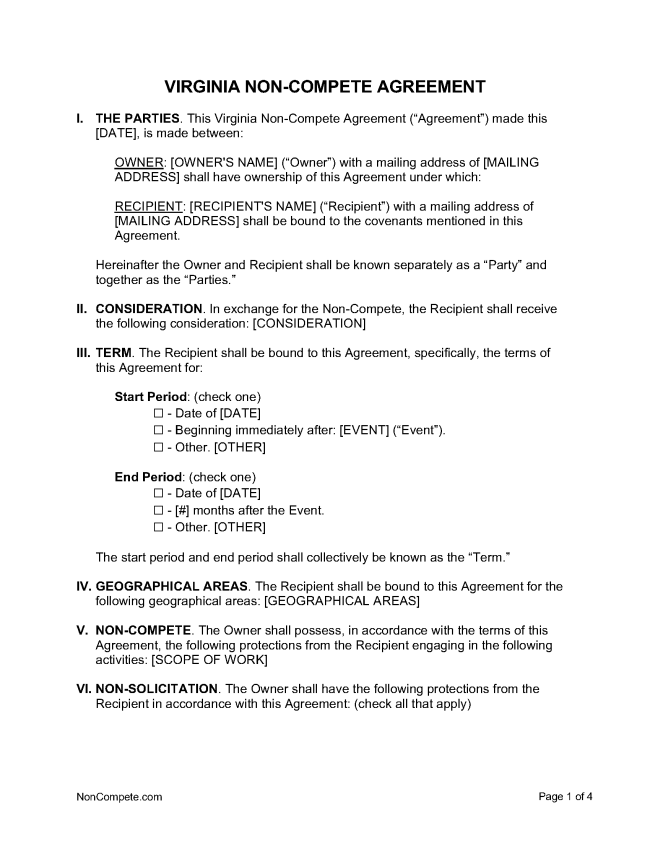A Virginia non-compete agreement is a portion of a contract that prevents an employee or the seller of a business from engaging in unfair competition. Non-competes can help businesses safeguard their intangible assets and proprietary information, but as contracts in restraint of trade, they are disfavored by courts. Therefore, non-competes must be drafted narrowly to balance the interests of the parties.
Table of Contents |
Are Non-Competes Enforceable in Virginia?
- The terms are not broader than what’s required to protect the legitimate interests of the business
- The agreement does not unduly impede the restricted party’s livelihood
- The agreement is not against public policy
(Omniplex World Servs. Corp. v. U.S. Investigations Servs., Inc. (2005))
Reasonableness
A non-compete agreement must be reasonably limited in geographic reach, timeline, and activity it seeks to restrict. (Home Paramount Pest Control Comp. v. Shaffer (2011)) Reasonableness is evaluated based on the particular circumstances surrounding each case.
In Home Paramount, a covenant that barred a former employee from taking any other job industry-wide was found unenforceable. Non-compete agreements can only restrict competitive activity that directly threatens the legitimate interests of a business based on the territory in which it operates and the nature of the work in question.
Protectable Interests
The purpose of a non-compete agreement is to protect a business from direct competition by someone with special knowledge or information of the company’s practices, usually a former employee or the former owner. Legitimate interests that can be shielded with a non-compete include:
- Customer contacts (Paramount Termite Control v. Rector (1989))
- Operating procedures and methods (Blue Ridge Anesthesia v. Giddick (1990))
- Trade secrets (VA Uniform Trade Secrets Act § 59.1-336) and other confidential information
Attorneys
Virginia’s Rules of Professional Conduct (5.6) prevent attorneys from entering any contract that restricts their right to practice law, except in agreements regarding retirement benefits or in the purchase and sale of a law firm.
Burden of Proof
Contracts in restraint of trade are viewed with skepticism by the courts. Therefore, the party seeking to enforce a non-compete has the burden of proving that it is reasonable and valid. (Modern Environments, Inc. v. Stinnett (2002)) Unclear terms will be construed in the restricted party’s favor. (Omniplex World Servs. Corp. v. U.S. Investigations Servs., Inc. (2005))
Continued Employment (consideration)
Virginia courts have not advanced a consistent rule as to whether continued employment alone is adequate consideration to support a non-compete agreement. In Mona Electric Group, Inc. v. Truland Service Corp. (2002), the court posited that new consideration would be required to support non-compete agreements if the Supreme Court were to rule on the issue.
Maximum Term
There is no set rule for the maximum duration of a non-compete agreement. The time length of the agreement must be reasonable given the circumstances of the case and necessary to protect the legitimate interests of the enforcing party.
Blue Penciling (allowed)
Virginia courts have not adopted a consistent rule about modification or partial enforcement of non-compete agreements, but several courts have rejected the practice. In Lasership Inc. v. Watson (2009), the court declined to modify and enforce an overbroad non-compete despite its provision that offered courts permission to blue-pencil. The opinion in Omnisec Int’l Investigations, Inc. v. Stone (2019) stated that modifying an otherwise unenforceable agreement to make it valid is an overreach of judicial authority.
